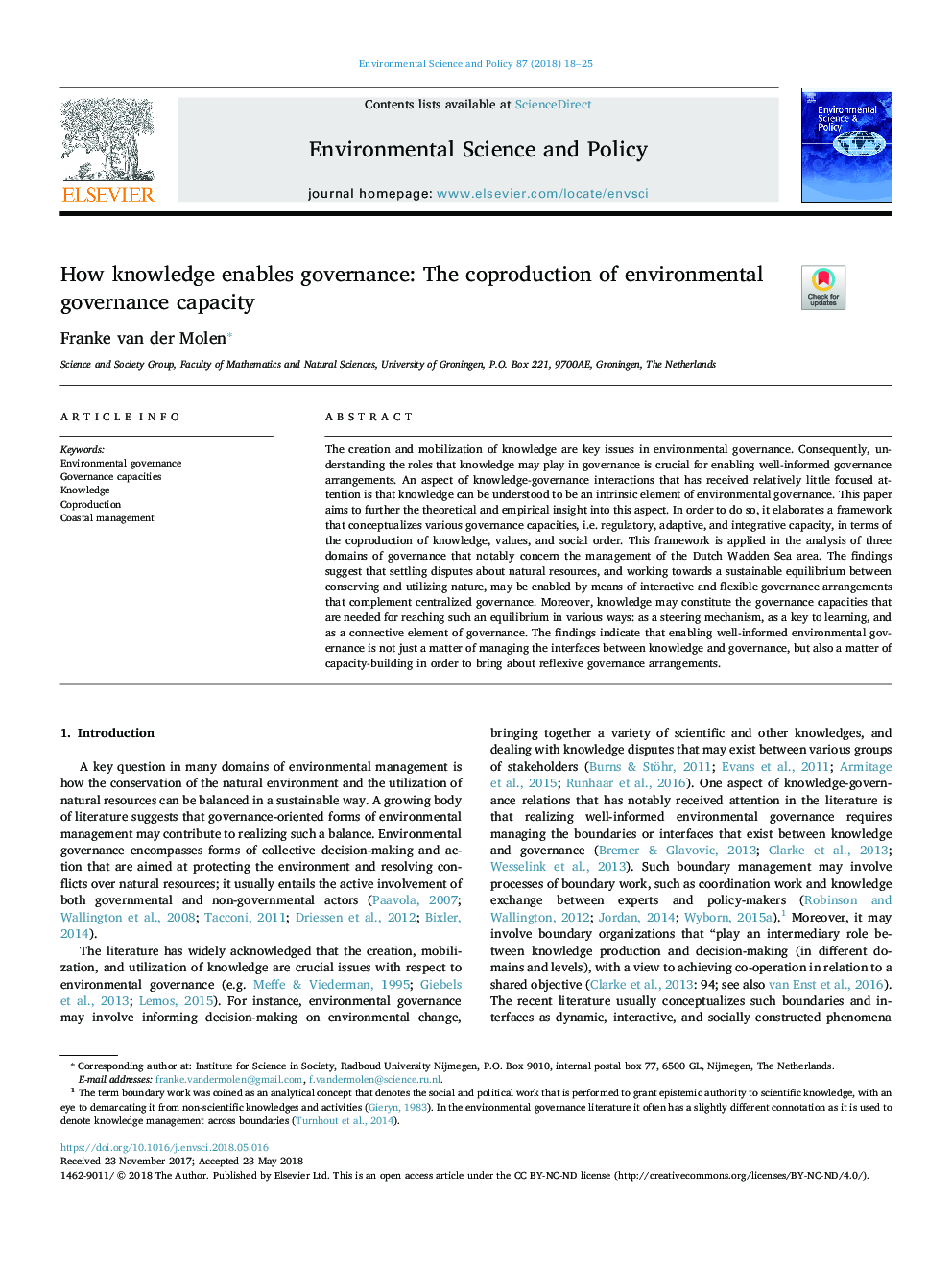| کد مقاله | کد نشریه | سال انتشار | مقاله انگلیسی | نسخه تمام متن |
|---|---|---|---|---|
| 7465782 | 1485021 | 2018 | 8 صفحه PDF | دانلود رایگان |
عنوان انگلیسی مقاله ISI
How knowledge enables governance: The coproduction of environmental governance capacity
ترجمه فارسی عنوان
چگونه دانش را قادر می سازد حکومت: تولید ظرفیت اداری محیط زیست
دانلود مقاله + سفارش ترجمه
دانلود مقاله ISI انگلیسی
رایگان برای ایرانیان
کلمات کلیدی
حکومتداری محیط زیست، ظرفیت حکومتداری، دانش، همکاری، مدیریت ساحلی،
ترجمه چکیده
ایجاد و بسیج دانش مسائل کلیدی در حکومتداری محیط زیست است. در نتیجه، درک نقشهایی که دانش میتواند در حکومت نقش بسزایی داشته باشد، برای تأمین برنامههای حکومت آگاهانه بسیار مهم است. یکی از جنبه های تعاملات مدیریت دانش، توجهی نسبتا کمی را به خود جلب می کند که دانش می تواند یک عنصر ذاتی حکومتداری زیست محیطی باشد. این مقاله با هدف بررسی دیدگاه های نظری و تجربی در این زمینه می باشد. برای انجام این کار، چارچوبی را ارائه می دهد که ظرفیت های گوناگون حکومت، یعنی نظارتی، سازگاری و ظرفیت یکپارچه را از نظر تولید تولید دانش، ارزش ها و نظم اجتماعی مفهوم می کند. این چارچوب در تجزیه و تحلیل سه حوزه حکومتی کاربرد دارد که به ویژه در زمینه مدیریت منطقه دریای وادن هلند مورد توجه قرار گرفته است. یافته ها نشان می دهد که حل اختلافات در مورد منابع طبیعی و تلاش برای ایجاد تعادل پایدار بین حفاظت و بهره برداری از طبیعت می تواند با استفاده از تطبیق های حکومتی تعاملی و انعطاف پذیر که مجهز به حکومت متمرکز باشد، فعال شود. علاوه بر این، دانش ممکن است ظرفیت های حاکمیتی که برای دستیابی به چنین تعادل به شیوه های مختلفی نیاز است را تشکیل دهد: به عنوان یک مکانیزم فرماندهی، به عنوان کلید یادگیری و به عنوان یک عنصر ارتباطی از حکومت. یافته های این تحقیق نشان می دهد که توانایی اداره محیط زیست به خوبی شناخته شده صرفا صرفا مدیریت رابط های بین دانش و حکومت نیست، بلکه موضوع ساخت و ساز ظرفیت برای ایجاد نظم انضباطی است.
موضوعات مرتبط
مهندسی و علوم پایه
مهندسی انرژی
انرژی های تجدید پذیر، توسعه پایدار و محیط زیست
چکیده انگلیسی
The creation and mobilization of knowledge are key issues in environmental governance. Consequently, understanding the roles that knowledge may play in governance is crucial for enabling well-informed governance arrangements. An aspect of knowledge-governance interactions that has received relatively little focused attention is that knowledge can be understood to be an intrinsic element of environmental governance. This paper aims to further the theoretical and empirical insight into this aspect. In order to do so, it elaborates a framework that conceptualizes various governance capacities, i.e. regulatory, adaptive, and integrative capacity, in terms of the coproduction of knowledge, values, and social order. This framework is applied in the analysis of three domains of governance that notably concern the management of the Dutch Wadden Sea area. The findings suggest that settling disputes about natural resources, and working towards a sustainable equilibrium between conserving and utilizing nature, may be enabled by means of interactive and flexible governance arrangements that complement centralized governance. Moreover, knowledge may constitute the governance capacities that are needed for reaching such an equilibrium in various ways: as a steering mechanism, as a key to learning, and as a connective element of governance. The findings indicate that enabling well-informed environmental governance is not just a matter of managing the interfaces between knowledge and governance, but also a matter of capacity-building in order to bring about reflexive governance arrangements.
ناشر
Database: Elsevier - ScienceDirect (ساینس دایرکت)
Journal: Environmental Science & Policy - Volume 87, September 2018, Pages 18-25
Journal: Environmental Science & Policy - Volume 87, September 2018, Pages 18-25
نویسندگان
Franke van der Molen,
